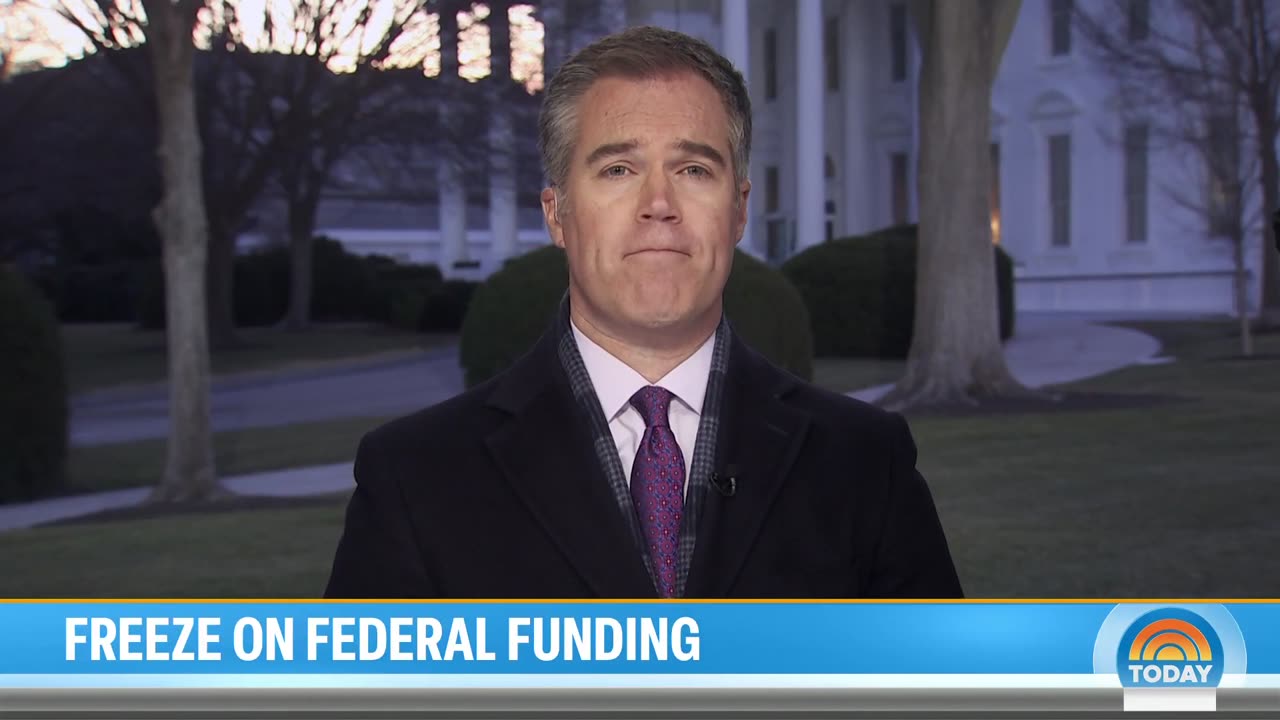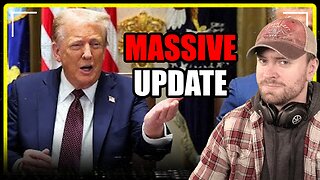Premium Only Content

Trump's effort to withhold federal funding will trigger 'imminent legal action'
WASHINGTON — The Trump administration’s attempt to withhold federal funding is fueling a long-brewing legal battle over the core constitutional principle that Congress gets to decide how to spend taxpayer money.
And like President Donald Trump’s early executive order on birthright citizenship, the fight is leading to immediate litigation that could quickly end up at the Supreme Court, with some Democrats already signaling plans to sue.
Trump’s Office of Management and Budget sparked the showdown with a memo issued Monday that ordered an immediate block on spending related to federal aid and programs.
The administration said the aim is to evaluate those programs to ensure they are aligned with Trump’s agenda, despite the the fact such funding was approved by Congress and signed into law. In a new memo issued by OMB on Tuesday, the administration said the order did not constitute a funding freeze and is not subject to the Impoundment Control Act.
“It seems clear to me that the Trump administration is aching to get this issue to the Supreme Court,” said Sam Bagenstos, who served as OMB general counsel under then-President Joe Biden. “The Trump administration clearly thinks they have a favorable court.”
The Constitution specifically states that Congress has the job of imposing taxes and spending money, giving it what is colloquially known as “the power of the purse.” It is the principle authority Congress has in separation of powers showdowns with the president.
“If you take it away, you’ve got a Congress that really can’t do much of anything in the face of an intransigent president,” said Josh Chafetz, a professor at Georgetown University Law Center.
Connecticut Attorney General William Tong, a Democrat, said in a statement Tuesday morning that “attorneys general across the country are preparing imminent legal action to protect our states” in the face of potential lost federal funding.
One lawsuit has already been filed by various nonprofit groups. Other lawsuits are possible, too.
“Our lawyers are in a series of meetings on that very subject today,” said a spokesman for Citizens for Responsibility and Ethics in Washington, a watchdog group.
Challengers to Trump’s actions to withhold funding would likely cite the Impoundment Control Act, a law passed in 1974 to regulate the president’s control over the budget. This followed efforts by then-President Richard Nixon to withhold spending on programs he did not support, like Trump has indicated his intention to do.
Under that law, the president can temporarily withhold funds — but must notify Congress first, and the decision cannot be based on policy grounds. The president can also ask Congress to rescind spending decisions, which can also be grounds for a pause in spending.
Trump’s nominee to run the OMB, Russ Vought, repeated during his recent Senate confirmation hearing his belief that the Impoundment Control Act is unconstitutional, foreshadowing a potential legal argument. Vought has not yet been confirmed.
A key supporter of Vought’s legal argument is Mark Paoletta, whom Trump has appointed to be OMB general counsel. Before the election, Paoletta co-wrote an article advocating for broad presidential powers, including the authority to withhold funding.
-
 LIVE
LIVE
Barry Cunningham
37 minutes agoLISA COOK | ADAM SCHIFF | LETITIA JAMES | ARE THEY BEING SACRIFICED BY THE DEEP STATE?
1,062 watching -
 LIVE
LIVE
MattMorseTV
1 hour ago🔴Trump just SHATTERED the PROJECTIONS.🔴
698 watching -
 LIVE
LIVE
Dr Disrespect
8 hours ago🔴LIVE - DR DISRESPECT - GEARS RELOADED GLOBAL LAUNCH - CRUSHING LOCUST
1,689 watching -
 LIVE
LIVE
SpartakusLIVE
5 hours ago$20,000 Hide and Seek Tourney w/ Stonemountain64 || #1 Rat wins the BIG CHEESE
302 watching -
 1:06:27
1:06:27
BonginoReport
2 hours agoBig Bad JB Threatens Trump! - Nightly Scroll w/ Hayley Caronia (Ep.120) - 08/26/2025
36.4K20 -
 1:02:26
1:02:26
Kim Iversen
3 hours agoIran Rejects Nuclear ‘Spy’ Inspectors — War Next?
20.2K36 -
 LIVE
LIVE
StoneMountain64
6 hours agoWARZONE LEGEND RETURNS. GHILLIE SUIT $20k TOURNEY.
166 watching -
 1:06:33
1:06:33
TheCrucible
3 hours agoThe Extravaganza! EP: 27 with Guest Host: Rob Noerr (8/26/25)
11.4K2 -
 LIVE
LIVE
GloryJean
9 hours agoHide & Seek Tournament w/ Spartakus, StoneMountain64 & Stevie
77 watching -
 LIVE
LIVE
Reidboyy
5 hours agoNEW FREE FPS OUT ON CONSOLE NOW! (Delta Force = BF6 with Killstreaks)
23 watching